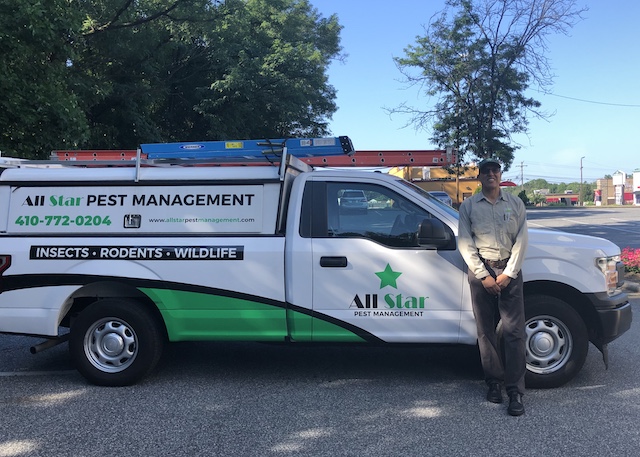It’s Cold Out. Your House is Warm. And Bats, Birds, Animals, Snakes, and Bugs Know It.
With the first wintry winds, all sorts of critters start looking for a warm place to shelter. And if your house has foundation cracks, uncapped chimneys, open attic vents, or soffit gaps, you might as well be saying “Come on in!”
When they do, you might be tempted to call somebody to patch up the hole – fast!
But stop and think – if you close the entry points without evicting your visitor, you could have a wild housemate trapped, hungry, and desperate in your home. Not a good idea!
Abderrahim (Abdul) El Hani of All Star Pest Management offers solutions to keeping your home pest-free without risk to you, your family, your pets, or the environment. With his M.S. in wildlife damage management and decades of professional training and experience, he takes a strategic approach to furry, winged, or slithering guests, and a minimal-toxicity approach to the six-legged or eight-legged variety.
The main strategy is exclusion, he says: first trapping visiting wildlife for release elsewhere; then, installing one-way doors to let critters out and keep them out; finally, sealing the entry points.
For rodents, poison is a last resort, El Hani says. “We start with exclusion and snap traps protected in boxes: the rat or mouse goes in and gets snapped. If that doesn’t work, in some situations we may need to complement with the use of poison. We keep the active ingredient low to minimize risk to nontarget species.” A poisoned rodent dying outside could be eaten by a cat, dog, hawk, owl or other predator, which would then die from secondary poisoning.
“Exclusion and trapping are the safest effective strategies,” El Hani concludes.
Homeowners can help with preventive tactics, he says. Keep chimneys capped, attic vents screened, gutters clean and guarded, and downspouts unblocked. If you feed wildlife or birds, keep feeders off your porch or deck to prevent wild guests from entering your house.
Some customers collaborate with All Star, adopting beneficial predators to eradicate other pests. One rural client, for example, asked El Hani to bring him any black snakes All Star captured, to catch insects and rodents (while black snakes are non-poisonous, they represent most of All Star’s snake calls). El Hani supplied the client with two to patrol his property.
While wildlife removal is El Hani’s favorite service, it represents only 25% of All Star’s business. The rest is dealing with insects – termites, centipedes, crickets, roaches, silverfish, bedbugs, and ants – even outdoor mosquitoes and stinging bugs during the summer months. Here, All Star uses natural, minimal-toxicity approaches rather than chemical applications.
Those approaches can range from time-honored treatments such as diatomaceous earth and boric acid, to baseboard spraying of floral-derived, low-toxicity insecticides. Rather than using gallons of chemicals around the perimeter of your home to stop termites, All Star installs monitored bait stations, equipped with attractant and wood-like pellets of pesticide. For infestations in the walls, All Star recommends boric acid-laced “TAP” pest-control insulation.
Here also, El Hani schools his clients in preventive measures. Moisture entering the house and seeping into beams, for example, attracts termites, centipedes, camelback crickets, and more: keep your basement dry by checking your foundation for cracks, waterproofing, and using dehumidifiers. Eliminate standing water outside your home to prevent mosquitoes from laying eggs. If you buy a live or cut Christmas tree, inspect it for insects or egg sacs before bringing it indoors.
El Hani has practiced integrative pest management (IPM) since he started as a young field scientist in a Moroccan agricultural program controlling bird and insect damage to crops. Coming to the U.S. in 1994, he earned an M.S. in wildlife damage management from Utah State University, following up with the National Pest Management Association’s Quality Green certification and other courses.
That training has enhanced his IPM experience. “Our industry is becoming more aware of the impact of pesticides on the environment,” he says. “The NPMA is trying to keep pesticides away from streams, with minimal exposure to people, pets, and non-target species. We’re particularly aware of our impact on vulnerable species such as bees. More companies are trying to use nonchemical approaches.”
Between their eco-friendly approach, effective treatments, and affordable rates, All Star has grown steadily since its 2001 launch: the field crew has grown from three to eight, including El Hani, who handles most wildlife calls. Meanwhile, three office staffers have taken on El Hani’s wife Kathryn’s administrative role while she works internationally, fighting poverty through the Millennium Challenge Corporation.
“We’re about doing the right thing,” says El Hani. “We didn’t grow fast – we still have just one branch, and we’re doing fine. We have loyal customers (mostly in Howard and Baltimore Counties) and lots of returning customers. It’s not about money for us – it’s about customer service.”

